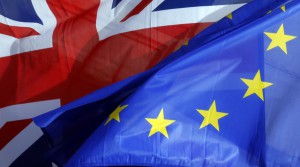The Brexit
Over the last few weeks I became convinced that we might very well go on to vote to leave the European Union (EU). In this part of Kent there was a palpable leave sentiment, maybe because this is where the main influx of migrants takes place. The ‘little Englanders’, as David Cameron superciliously called them, are turning Europe upside down. There has been this unfortunate habit of the ‘remain’ campaigners to talk down to the great unwashed who do not want to stay in Club Europa. In spite of all the powerful economic arguments and warnings by national and international financial experts and institutions against Brexit, the rank and file have firmly rejected the status quo and voted for self-determination against German domination. We will now probably end up with higher prices in shops, an increase in inflation, reduced house prices and the pound has already gone down to levels not seen since 1985. The financial services sector is a huge part of the UK’s economy as London is the largest financial services exporter in the world and the future of this part of the economy is now uncertain, to say the least.
The fact that the voters of the second largest economy have chosen to take the exit route is likely to have a massive influence on the future of the EU and on the United Kingdom of Britain and Ireland as well. David Cameron has already tendered his resignation and Labour’s Jeremy Corbyn is likely to either fall on his sword or to be pushed out as large swathes of Labour’s heartland voted to ‘leave’.
Radio Four quoted a survey in Sweden that indicated that the majority of Swedes will want to leave the EU if the Brits go that way. The other Nordic countries might well feel the same as they did not adopt the Euro in the first place, with the exception of Finland. There are also serious rumblings across the Channel and rumours of a possible Frexit (France) or Nexit (The Netherlands). Scottish First Minister Nicola Sturgeon wasted no time in announcing measures to set the ball rolling for another Scottish independence referendum, as the ‘remain’ vote carried the day north of the border. How their economy will survive with the low oil price is another matter. The border between Northern Ireland and the Republic will have to be re-instated again and Spain has already renewed their claims on Gibraltar.
Why have the usually very sensible British people made this drastic and courageous choice? The overwhelming reason is that they fear their way of life is under serious threat from mass migration. Core values will always trump financial expediency. Jonathan Haidt, a prominent social and cultural psychologist, came to the conclusion that ‘Intuitions come first, strategic reasoning second’. One of my older patients, who used to be a banker, confided in me and remarked that ‘We have been getting immigrants for hundreds of years, but always in numbers that could gradually integrate. However, now we feel overwhelmed.’ There is already a lot of futile hot air about racism and xenophobia flying about from those ‘remainers‘ who advocated love and tolerance before the referendum and now we see ‘elitism erupting like a poisoned boil as the culturati weep into their lattes while demonising the poor, old and insecure,’ according to Libby Purves in The Times.
I spent four years working in London in the seventies and eighties and I can clearly remember how the Northern Ireland conflict and the battles between Margaret Thatcher and the trade unions always led the grim news category and just seemed to go on forever. Violent clashes between Turks and Greeks in Cyprus and later the Falklands War dominated the news at different periods. South Africa and Rhodesia/Zimbabwe and the accompanying racial conflicts were also regular items at the time. The buses and underground trains were manned by West Indians who had to endure a lot of discrimination in the beginning but were gradually integrated without posing any cultural threats as they spoke the same language, more or less, and they derive from a Christian background.
In 1968 Enoch Powell created quite a stir with his ‘Rivers of Blood’ speech and that still reverberated in the seventies and might still prove to be prophetic. The biggest cultural issue in 1976 was the Sikhs who were allowed to ride bikes with their turbans and without a helmet. From 1989 they could also work on building sites without the otherwise compulsory hard hat. This was quite an extraordinary u-turn for a society where health and safety is paramount.
But since we arrived in 1999, there was a different slant to the news, it had shifted to the imams preaching hate and violence in mosques and prisons, honour killings, female genital mutilation, and later the grooming and sexual exploitation of young girls on a massive scale in Rotherham and elsewhere, mostly by men of Pakistani origin, rising anti-Semitism and even breast ironing of young African girls. These were serious cultural threats that could not be ignored. In 2012, for example, even the Queen felt compelled to remark on the fact that the notorious Abu Hamsa was allowed to carry on with his radical sermons in the Finsbury Park mosque. This led to inevitable political consequences, as the growth of UKIP has demonstrated.
However, leaving the EU is not going to solve the migrant issue on its own as just as many migrants came from elsewhere and the biggest cultural threat to women’s rights, for example, does not come from the Eastern European nations anyway. The UK government’s migration policy on border controls is clearly in trouble even without the EU. David Frum, the chairman of the US think tank Policy Exchange, emphasises that ‘Borders are as necessary to a free society as laws; they are the first law that makes a country a country.’
Migration should mainly be a managerial challenge in a mature developed economy. You should be able to import the skills and experience that your particular situation requires and then have scope to accommodate real refugees as well.
Now that we are leaving there is still the need for willing and able hands in the building trade and in the fruit industry – jobs that the unemployed Brits do not seem to want to do as generations of benefits have created a sedentary underclass and the honest, hardworking Brits feel, with some justification, that the immigrants are pushing wages down.
Australia’s system of awarding points has featured quite a lot in the EU debates. The UK has a long way to go before it will reach that point. The EU’s inherent flaws of trying to enforce a common monetary policy on such diverse economies as Greece and Finland and of chasing the chimera of free movement of people in the Union when it cannot even secure the outer borders of Europe have drastically diminished its credibility. Is there another economic block in the world where the borders between the member countries have been eliminated?
How long before the next Greek debt crisis comes to the surface?
No single country can offer refuge to all the economic migrants from the poor countries. Angela Merkel made a brave but rash and reckless decision without even bothering to inform the CDU’s Bavarian sister party, the Christian Social Union (CSU), or Germany’s neighbours before doing so and subsequently triggered a wild influx of migrants that mirrored a scene from the Old Testament. This decision had far-reaching consequences; it has fuelled a demand for an escape from the dreadful Syrian situation, but also for those from other poor countries seeking a better life and is still now affecting faraway Greece and Macedonia. Consequently the German Chancellor was forced to broker a deal with an increasingly despotic Turkish leader. The European freedom of movement principle was dramatically shown up as inherently weak and unworkable. Her motives might have been honourable but there is clear evidence that mass migration is a serious threat to a liberal society. It is there for all to see: Merkel, the backlash in France with Le Pen, in Holland where Geert Wilders is prominent, in Austria where the Freedom Party came close to winning the last election, in the UK with UKIP making huge strides and indeed in Trump’s unfortunate rise to fame in the US.
Simon Reeve, a television journalist who is well-known for his worldwide travel programmes, was on the Greek island of Crete in February where he was astonished by the arrival of boats loaded with refugees whilst they were filming. Simon listened with obvious compassion to the stories of hardship and suffering and ended up tearfully hugging the individuals. As he drove off in the baking heat he remarked on the fact that these exhausted refugees now have to walk 30 km to a refugee centre. He then noticed two women, one of whom was carrying a baby. He stopped and told them to get in, which they promptly did. But as he tried to speed up, their male compatriots bumped violently on the car and ordered the women out of the car as they had no permission to travel with a single male. And when they got out not one of the men lifted a finger to help them carry the baby and the two women had to struggle on on their own. These Syrians were exhausted and seemed desperate, but it was a stunning demonstration of their take on women’s inferior role in society. The spectre of a million Syrians with German passports in a few years’ time featured prominently in the hectic debates.
We might be witnessing the beginning of the end of the European Union and history might conclude that Angela Merkel’s moment of ‘migration madness’ was indeed the straw that broke the camel’s back.
Pieter de Lange
Also read Merkel’s migration madness: Is ‘Brexit’ beginning of the end for EU?
Share on
Latest articles




















